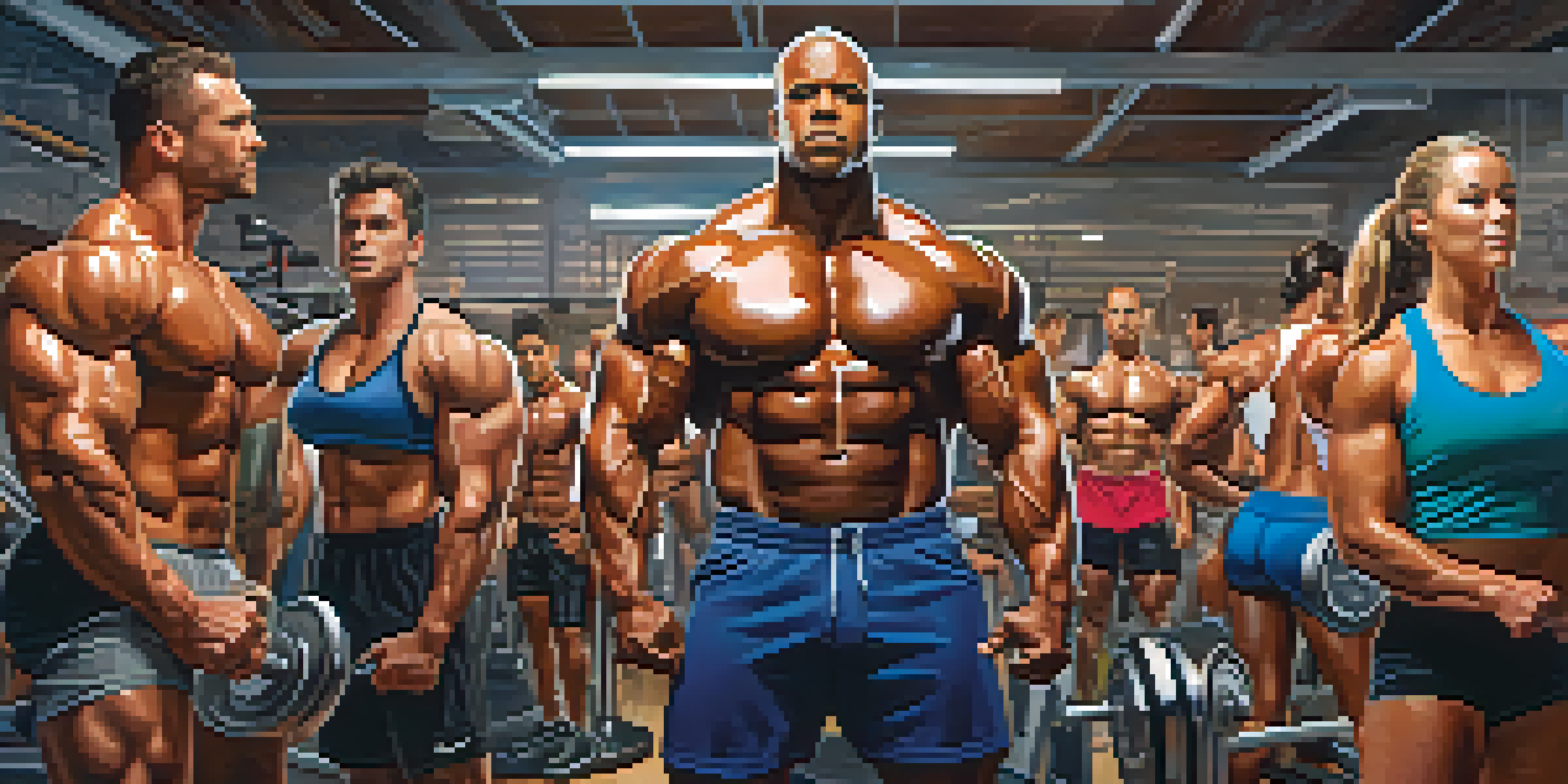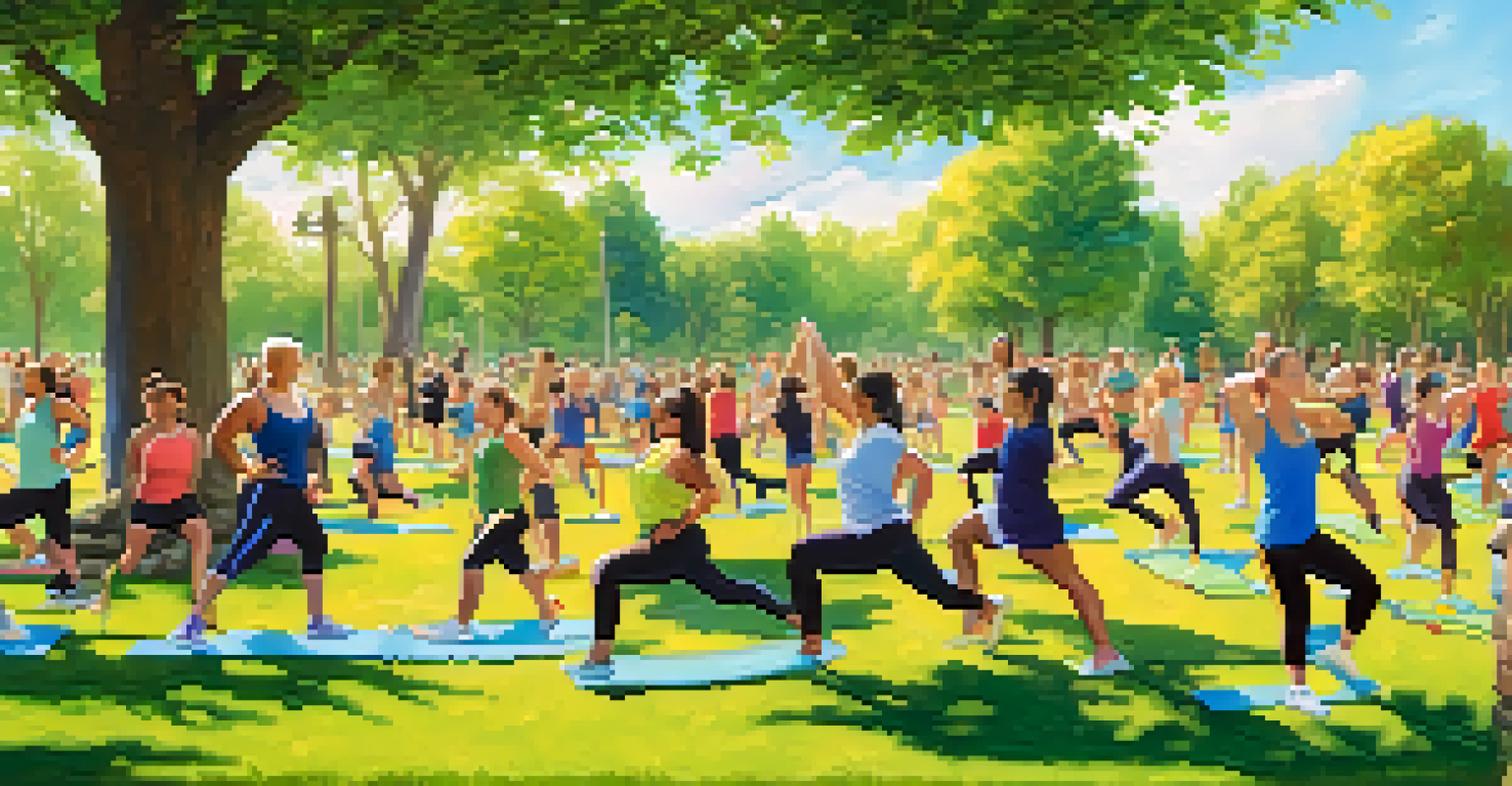Social Media's Influence on Bodybuilding and Self-Image

How Social Media Shapes Bodybuilding Communities
Social media has revolutionized how bodybuilders connect and share their journeys. Platforms like Instagram and TikTok allow athletes to showcase their progress, routines, and transformations, creating a vibrant online community. This instant access to a plethora of content fosters a sense of belonging, encouraging both seasoned lifters and newcomers to engage with one another.
Social media can amplify the negatives of comparison, but it can also be a powerful tool for connection and support in the fitness community.
For example, hashtags like #FitnessMotivation or #BodybuildingJourney bring together individuals from diverse backgrounds who share a common goal of fitness. These communities often provide support and inspiration, helping users push through their plateaus. However, this constant sharing can also create pressure to meet certain physical ideals.
The challenge lies in balancing inspiration with the reality that not everyone’s journey is the same. While some may find motivation in these communities, others may feel inadequate when comparing their progress to curated posts. It’s important to remember that social media often showcases the highlights rather than the full story.
The Pressure of Idealized Body Images on Social Media
One of the most significant impacts of social media is the perpetuation of idealized body images. Many influencers and bodybuilders showcase their physiques, leading to unrealistic expectations for followers. This can create a cycle where individuals feel compelled to alter their bodies to fit these ideals, often at the expense of their mental health.

For instance, filters and photo-editing tools can enhance images, making them appear more polished than reality. This can skew perceptions of what a 'normal' body looks like, especially for impressionable audiences. The result is a culture that often prioritizes aesthetics over health and well-being.
Social Media Fuels Bodybuilding Bonds
Platforms like Instagram and TikTok create vibrant communities for bodybuilders to share their journeys and support one another.
It’s crucial for users to critically evaluate the content they consume. Engaging with diverse body types and promoting body positivity can help combat these unrealistic standards. By shifting the focus from perfection to progress, we can foster a more inclusive environment.
The Role of Influencers in Bodybuilding Culture
Influencers play a pivotal role in shaping bodybuilding culture through their reach and engagement. Many fitness influencers share workout tips, diet plans, and personal stories, making fitness more accessible to the masses. Their ability to connect with audiences can inspire thousands to start their own fitness journeys.
The greatest wealth is health.
However, not all influencers promote healthy practices. Some may endorse extreme diets or unsustainable workout routines in pursuit of likes and followers. This can mislead their audience, leading to harmful behaviors rather than building a healthy relationship with fitness.
As consumers of social media, it's essential to discern credible information from trends. Following qualified professionals who emphasize balanced, science-backed approaches can help individuals navigate the vast sea of fitness advice while protecting their well-being.
Mental Health Implications of Social Media on Bodybuilders
The intersection of social media and bodybuilding often comes with mental health implications. The constant exposure to idealized bodies can lead to feelings of inadequacy, anxiety, and even depression for some individuals. These feelings can be exacerbated by the pressure to maintain a certain image online.
Many bodybuilders may feel they need to showcase their progress at all times, leading to burnout. The fear of not measuring up can create a toxic cycle of overtraining and under-eating as they chase after the 'perfect' physique. It’s vital to recognize when social media use becomes detrimental to mental health.
Idealized Images Impact Mental Health
The pressure to meet unrealistic body standards on social media can lead to feelings of inadequacy and mental health struggles.
Encouraging conversations about mental health within the bodybuilding community can mitigate these issues. Support groups and open dialogues can foster a sense of camaraderie, reminding individuals that they are not alone in their struggles and that their worth is not solely defined by their appearance.
The Impact of Fitness Challenges and Trends
Fitness challenges and trends are ubiquitous on social media, drawing users into specific routines or diets. While some of these trends can promote physical activity and community engagement, they can also lead to unhealthy competition and unrealistic expectations. For example, the viral nature of challenges can pressure individuals to perform beyond their limits.
Moreover, the fleeting nature of trends can create a cycle of chasing the 'next big thing' rather than focusing on sustainable practices. People may jump from one challenge to another without allowing their bodies adequate time to adapt and recover. This can result in injuries or frustration when results don’t match expectations.
To navigate this landscape, it’s essential to approach fitness challenges mindfully. Participating in challenges can be fun, but prioritizing personal health and long-term goals should always come first. Finding a balance between enjoying trends and maintaining a sustainable routine is key.
Building a Healthy Relationship with Social Media
Developing a healthy relationship with social media is crucial for bodybuilders and fitness enthusiasts. This involves curating your feed to include content that inspires and uplifts rather than triggers negative emotions. Following accounts that promote body positivity, mental health awareness, and healthy lifestyle choices can create a more supportive online environment.
Additionally, setting boundaries around social media usage can help maintain a healthy balance. For instance, limiting scrolling time or taking breaks from social media can prevent feelings of overwhelm. Engaging with the community in a way that feels authentic and supportive is more beneficial than mindless consumption.
Focus on Sustainable Fitness Trends
While fitness challenges can promote engagement, it's essential to prioritize personal health and avoid chasing fleeting trends.
Ultimately, social media should enhance your fitness journey, not detract from it. By fostering a positive online space, individuals can find motivation and support while remaining grounded in their personal goals and values.
The Future of Bodybuilding in the Age of Social Media
As social media continues to evolve, so too will its influence on bodybuilding and self-image. The rise of new platforms and technologies may change how bodybuilders share their journeys and connect with others. This can lead to more diverse representations of fitness and body types, promoting inclusivity within the community.
Furthermore, the focus on mental health and well-being is becoming increasingly prominent in fitness conversations. As more individuals advocate for balanced approaches and self-acceptance, the culture surrounding bodybuilding may shift toward prioritizing health over aesthetics. This could foster a more sustainable and supportive environment.

Ultimately, the future of bodybuilding in the digital age relies on how individuals navigate these platforms. By promoting authenticity and supporting one another, the bodybuilding community can cultivate a healthier relationship with social media that empowers everyone to thrive.